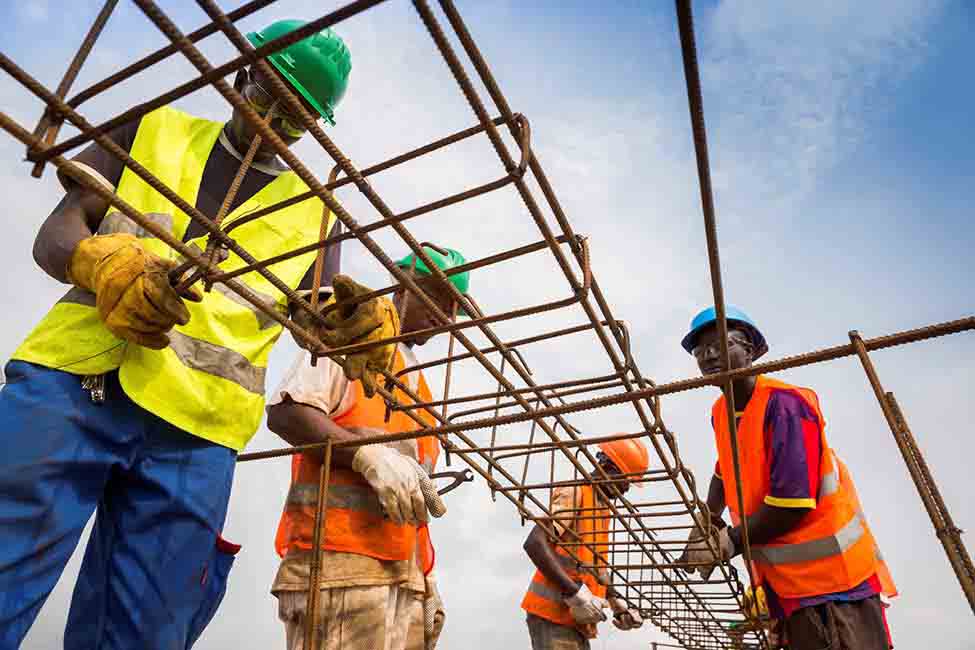

Getting a business loan in Nigeria is becoming increasingly difficult. This civil engineer had to try very creative ways to secure construction materials on credit to finance his business. He smooth-talked a major supplier to grant him a N15 million credit after spending three days in his shop. This became the start of a long business relationship.
What are you into?
I am a civil engineer. I run a construction business. We design and build residential and commercial buildings. We work mainly with multinationals on the development and expansion of their buildings – offices, factory production floors, warehouses etc.
When did you start?
I started the construction business while I was still in school. This was over 15 years ago. I have a brother in the United Kingdom who wanted to build a house. Since I was studying civil engineering, I saw this as an opportunity to help. I got very involved in the project. A year later, I did my industrial attachment in Abuja with one of the biggest construction firms in the city. The company was building a mini-estate in Maitama. I learned a lot during the project but the experience I had got from working on my brother’s construction earlier proved invaluable. I was more competent and useful than the usual I.T student. I had no doubt in my mind by then that I wanted to do construction and nothing else.
What were your financing needs when you started your business?
For the first three or four years, we worked just for private clients: individuals who wanted to build houses. They often make funds available for their projects from the moment you move to the site to begin work and as the project progresses. The project is divided into milestones and the client pays when you complete each of them. So, we didn’t need to get business loans from banks.
When did your financing needs start to evolve?
It changed slowly as we grew bigger. We started working for banks. The banks pay about 40% as mobilization, then when you get to some milestone, they come to the site with their quantity surveyor for evaluation, just to know what you have done so far and to verify if they can pay you more. We hardly needed funds to execute projects. We just sourced for materials on credit and paid the suppliers whenever the bank paid for the next phase after evaluation.
So, how are multinationals different?
The challenges with funding started when we started to build for multinational companies. I still remember our first job with a big multinational 12 years ago. We got the contract and happily moved to the site with our equipment. We kept waiting for mobilization. I then contacted the Procurement Manager to ask why it was being so delayed. He was shocked. He asked, did you go through the contract agreement? He then explained to me that they don’t pay for mobilization. He said that they pay thirty days after the project is invoiced if no errors are found in the execution of the project. Luckily, we had some savings from the jobs we had done for the banks. We ran around to borrow more funds for the business and we were able to deliver on time.
Also Read: Consumer Credit Will Make Banks More Profitable – Yvonne Johnson, CEO Indicina


So that’s how your company started to borrow funds?
Yes, it was tough at the initial stage. We borrowed from friends and family. I also started to learn how to convince traders to let me take larger quantities of materials on credit. We were stuck on one of our early projects with a multinational. We had spent all our money and everything we could borrow. Work was about to stop because we didn’t have money for materials. I told the vendor I would sign an undertaking and post-dated cheques but he did not agree. I got more desperate and more inventive so I asked him to take my car papers and signed an agreement that he should sell the car if I didn’t pay by a certain date. He agreed.
What was the worth of the materials you signed away your car for?
It was only N600,000 but this was about ten years ago; it was a bit of money then. During our second transaction with him, we had money so I paid in cash and added almost a million naira extra. He called me thinking I had made a mistake. I told him to keep the money, that we would use it later. He was beside himself with joy. They too need capital. That cemented our relationship. As we got more contracts from the multinational, the traders developed more trust in us. We now have suppliers that give us up to N15 million credit. That was how we started moving. The suppliers don’t get anything extra for the credit they allow us. The payment for the contracts goes to the banks who make money on transactions. We approached the banks after about 16 months of delivering projects for two multinational companies to apply for loans. We have many other expenses apart from buying materials and you can’t get every material on credit from suppliers.
What bank did you take your first loan from?
We started with FCMB. They gave us a loan worth N2 million which they tagged LPO financing. But FCMB later decided their LPO financing facility could only be used for supplies, not construction. Their thinking was that while something could go wrong with a construction project, supply is very straightforward, less risky. Anyway, we moved to First Bank with whom we had a longer relationship of about 7 years. First Bank was very useful in financing our work over this period. We got a N40 million loan from them. There were several smaller ones worth between N6 million and N15 million. Unfortunately, First Bank also decided they don’t want to use LPO financing for construction again.


Have you found another bank to borrow from?
Not really. We are still looking for one. But lately, First Bank has approached us again that they are ready to do business now. But the last one we took to them didn’t fly because they said the company was new in Nigeria and was not on their enroll list. Most banks have lists of companies they enroll, from whom they can finance purchasing orders (POs). Banks can be very rigid. Imagine not financing the work of a multinational that is one of the biggest in its field globally just because they are new in Nigeria.
Between the banks and suppliers you buy on credit from, which have you found more useful?
Both, really. But lately, the suppliers have been more helpful. They are very accessible. You talk to the person who will make the decision. They are proactive. The turnaround for transactions, I mean decision-making, is always 24 hours if not instant. The more transactions we do with them, the more they trust us. There are suppliers we have dealt with for two years who let us take goods worth N6 million on credit without signing anything.
So customers that you have known for two years trust you more than banks that you kept money with for 10 years?
Unfortunately. The banks have not been so good with us. I always tell my friends that we don’t have banks in Nigeria, what we have are alajos (thrift savings collectors). They are only interested in getting your money. That is just the bitter truth. The suppliers have been more helpful lately.
What kinds of things do you buy on credit?
We buy cement, granite, ceilings, paints and many more on credit. We have been using our cement supplier for the past nine years. He supplies us cement anywhere in Nigeria now, even for projects in the North and the South-South. We started with Lagos, then Ibadan. We just call him and he sends the trailer. The last supply he did to Calabar was three trailers of cement. That is 900 bags, worth about N2.7 million.


You can get all your materials on credit?
No. We have new jobs that require materials we have not used before or in big quantities. Around June 2016, we needed plywood worth N13.5 million. I had never dealt with the old man in Isale Eko who could supply it. I arrived at his shop before 9 a.m. I told him I needed goods worth over N13 million but I had only N500,000. He flatly refused, saying he had never even met me. The idea was so ridiculous to him he was just laughing. I told him that he didn’t have to know me and said I was confident we would do a lot of business together. He shared many experiences over the years of supplying things on credit and people disappearing with his money.
Also Read: Jamborow: Bringing Financial Services to 400 Million Underserved Africans
Did you succeed in convincing him?
I kept on pestering him. I went there again the following day in the morning. He was shocked to see me. I tried my old trick – I gave him my car documents and a post-dated company cheque. I told him I was aware it was a criminal offence to give a cheque that would not be honoured, so I wouldn’t risk the embarrassment. He was still very reluctant and the hours passed. But I refused to leave. He agreed at last. I paid him back within a month and he was so happy. We did business worth over N65 million with him in 2016 and over N100 million in 2017. Someone he trained, who was also selling plywood in the market, had introduced me to him. After the guy saw that I was paying, he came to me and said: Chairman, you don’t need to see Baba again, I can do the supply. He just cornered the deal, effectively using the old man to establish our creditworthiness.
Do you deal with the younger man now?
Yes. Recently we did a ceiling job for a client and I approached the man and said, I know you don’t sell the materials I currently need, but I am sure you have colleagues that sell what I need. He got the materials for me on credit from his friends in the market. All this was done over the telephone. He even got the truck that delivered the materials to me. We have stayed in business only because of the trust we have established with our suppliers.
Why do you think the banks are not granting loans? Could the problem be that the staff in the branches don’t communicate the viability of projects well to the headquarters for approval?
No. The problem is actually from the headquarters or whoever approves loans. The staff we deal with at the branch level understand our business and trust our record. I tried to finance a project last October through a bank loan. The branch manager was confident that he would get approval. He was almost as disappointed as I was when people above him said no. You won’t believe he lent me N1 million of his personal money just to compensate for raising my hopes.
How do you think the banks can minimize their risks when lending to construction firms?
The people in the headquarters have to be more innovative. Some people sat inside air conditioner and decided – we can’t finance construction again because the corporates won’t pay if the job has defects. Can’t they develop a system for grading civil engineering firms who apply for loans to finance construction? Things like finding out who the companies have worked for, for how long, how many projects have they delivered without defects etc. would help them lend while minimizing their risks. When people say a civil engineer messed up a project, I always ask – how did you select the company? Did you give the job to your townsmen or someone who will give you bribes or you found a company through a rigorous procurement system? The multinationals have procurement systems that deliver quality jobs, so a company that has worked for seven multinationals for more than a decade has little risk of messing up a project.







